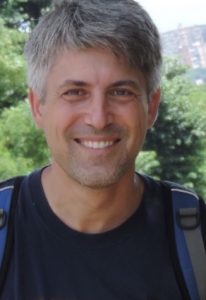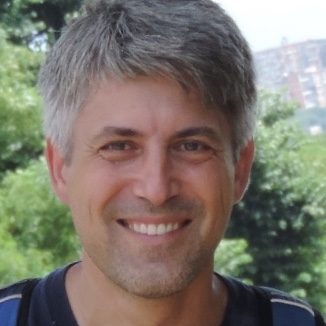By Matthew Woodbury
Dr. Pierluigi Erbaggio received his PhD in Romance Languages from the University of Michigan in 2016. He is an Administrative Assistant at the Consulate of Italy in Detroit, MI. He spoke as part of U-M’s PhD Connections: A Career Conference in April 2018 and agreed to share some more perspectives about his own trajectory.
Italy’s diplomatic presence in Michigan began over a century ago with the appointment of a consular agent in 1899. Today, Dr. Pierluigi Erbaggio works alongside eight other staff at the Consulate of Italy’s offices in downtown Detroit. His responsibilities as an administrative assistant include developing programming for events sponsored by the consulate and providing legal and documentary services.
A typical morning could begin with citizenship appointments and interviews. During these meetings applicants discuss their family histories and present material supporting their eligibility for an Italian passport. In the afternoon, Dr. Erbaggio might help prepare legal documents – such as paperwork relating to powers of attorney – or write declarations granting permission to US citizens seeking to get married in Italy. Dr. Erbaggio also updates the Consulate’s social media accounts and website, helps process visa applications for travelers, and sometimes has to “respond to emergency situations, such as traffic incidents or conditions of extreme distress involving Italian citizens.” Since the Detroit Consulate’s geographic reach covers five US states – Indiana, Kentucky, Michigan, Ohio, and Tennessee – there is a large volume of calls and requests for services. One of the daily challenges of his job “is to be able to stay focused on task while switching from one duty to another.”

Dr. Erbaggio cites “personal considerations and a good dose of fortuity” as leading to his job at the consulate. As he researched and wrote a dissertation – Editing Mussolini: Il Duce’s American Biographies on Paper and on Screen, 1922-1936 – Dr. Erbaggio became increasingly “aware of the scarcity of tenure-track positions in Italian studies.” To gain a broader sense of his transferable skills and learn creative ways of finding careers, he took part in the inaugural What Now? Career Paths for Ph.D.s seminar run by Rackham Graduate School. At U-M he also diversified his research and teaching experience through completing a Graduate Teaching + Digital Media Certificate offered by CRLT and a Graduate Certificate in Screen Arts.
In late 2014, towards the end of his degree program and as he waited to hear back from visiting and tenure-track academic positions, Dr. Erbaggio applied for two openings at the Consulate of Italy. Eventually “in March of 2015 [he] had to choose between a visiting assistant professor position at a small liberal arts college and the two openings at the Consulate.” Contributing to his decision was that as both a husband and a parent to young children, he was “uninterested in the nomadic aspects of academic careers.” Finding humanities employment outside of academia had the potential to provide a more stable future.
Starting work at the Consulate in November 2015, Dr. Erbaggio credits his graduate studies with preparing him to manage a large number of concurrent tasks that each have a varying timeframe. Interacting with a broad cross-section of the public both in person and through written communication draws on his doctoral experience adapting language, register, and content for a range of purposes. His experience in interpreting and modulating information – developed through his own teaching and work as a Graduate Teaching Consultant – is also useful when he has to “to summarize complex bureaucratic procedures in few words and easy-to-follow steps.” Research and analytical skills developed during graduate school are useful when Dr. Erbaggio has to “find, decipher, and apply Italian regulations.” At the Consulate there is also “a great deal of collaboration, a skill [he] practiced and taught at the University of Michigan.”
When reflecting about his own path and thinking of advice he might give to humanities PhDs, he wishes “he had known even earlier about possible alternative careers and had participated in more career workshops or finding ways to shadow professionals or to volunteer in various units that are present on campus.” One example of an opportunity he did pursue while in graduate school was his work organizing the Italian Film Festival USA in the Metro Detroit area. The annual festival brings in over 3,500 people to watch more than a dozen movies. Being part of the planning team allowed Dr. Erbaggio to keep up to date with Italian cinema and provided an opportunity to work with the local Italian and Italian-American community – something he does now for the Consulate. “Furthermore [the festival] has prepared me for one aspect of my current position that I love the most, that is, the planning and managing of cultural events.” One of these events – an annual screening of restored classic films from the Cineteca di Bologna – bridges his work and his professional training in media and film history.
Dr. Erbaggio would like graduate students to have confidence that the doctorate “and their work are preparing them to be versatile professionals and they will be able to find a gratifying position in which their skills and abilities will be put to use.” When considering future possibilities he encourages students to consider their commitments and interests outside of their academic training. Perhaps there is a “volunteering activity that could be further explored, [or] a group or organization in which [one] could get more involved?” Within the academy, ideas about future trajectories might come from considering if there is an “aspect of [students’] academic lives that they enjoy more than others: counseling students, writing, working with archival materials, or finding real-life, social connections with what they are studying.” Personal interests and motivations are worth listening to, since “without knowing, [students] might be already exploring an alternative path and with just a bit more engagement and self-awareness, they could build a viable career for themselves.”
More Alumni Voices
[rpwe limit=”100″ thumb=”true” length=”20″ thumb_height=”100″ thumb_width=”100″ thumb_align=”rpwe-alignleft” cat=”20″ excerpt=”true” readmore=”true” readmore_text=”Read More »”]


